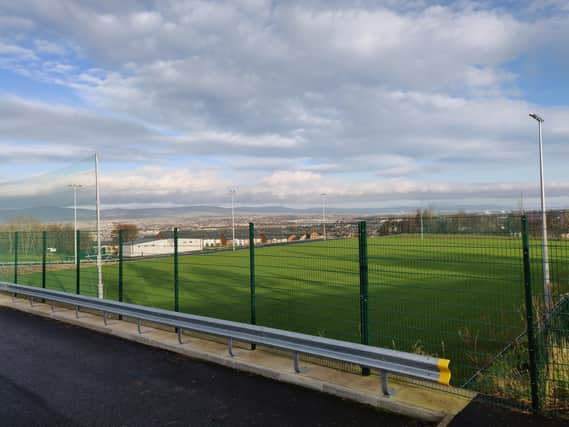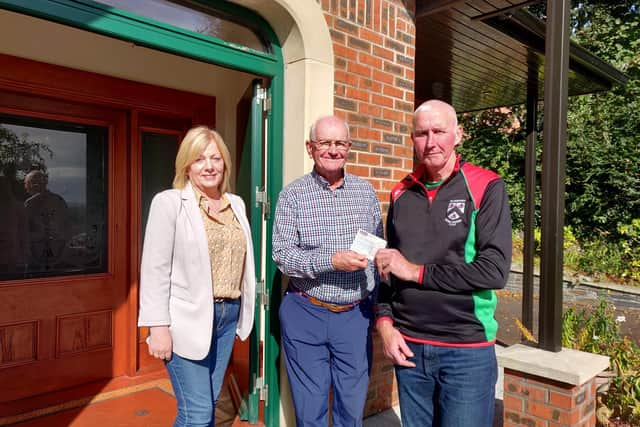The 80 year old Gaelic Park Fund that found a home in Doire Trasna's Field of Dreams . . .


It’s not there every night. It’s intermittent at best yet unmistakable none the less, and promising to become much brighter over the next few years.
The gates of Doire Trasna’s impressive new home should have welcomed its residents in September but like so much of 2020, COVID-19 intervened to derail the best laid plans. Frustrating? Of course, but when you’ve been waiting close to 80 years for a place to hang your hat, what’s another couple of months!
Advertisement
Hide AdAdvertisement
Hide AdBut while the official handover has had to wait, the very existence of the new pitch brings to an end the remarkable story of the Waterside Gaelic Park Fund, a tale that stretches back to the early ‘40s.


It’s July 2nd, 1944. A group of civic minded Waterside Gaels assemble in St. Patrick Hall on Spencer Road. Among the 20-strong crowd is Sammy Burke, originally of Chapel Road. The meeting is chaired by Belfast native, Sean McKeown, a teacher of Irish at the Christian Brothers Brow-of-The-Hill school and father of Ciaran McKeown who would go on to found the Peace People Movement alongside Mairead Corrigan and Betty Williams in 1976.
The only item on the agenda is “to establish a GAA pitch within the Waterside Parish” and by the stage time was finally called on the meeting later that evening, the new Waterside Gaelic Park Fund had been established with McKeown as Chairperson, Frank Dorrity from Simpson’s Brae as Treasurer and Sammy Burke as Honorary Secretary and tasked to embark on a fundraising drive.
The Waterside parish in those days extended from Newbuildings to Enagh Lough and included Ardmore. Apart from the chapel, the parochial house and the boys’ and girls’ schools all on Chapel Road, the parish had to maintain the chapels and schools at Ardmore and Enagh Lough in addition to St. Patrick’s Hall. A massive undertaking, particularly with a relatively small community so the commitment by a group within the parish to the pitch project was hugely ambitious with the world still in the ravages of World War Two.
Advertisement
Hide AdAdvertisement
Hide Ad“It was basically a meeting to form a committee which would run annual sports in the parish, the proceeds from which would be used to help build a Gaelic park in the Waterside,” explains Ciaran Burke, son of Sammy, and last surviving Trustee of the fund.
Ciaran has been guardian of the fund for many years, inheriting the role from his father, and retains many of the original transcripts from those early meetings. Hugely successful in its early years, the Waterside Gaelic Park Fund was run by the community for the community until external pressures meant the fund had to be frozen around 1947 with £833 in its coffers, the equivalent of £35,000 in today’s money. The reason? The Parish desired to replace the Pat’s Hall with a new building and made a request to the Gaelic Park Committee to channel their resources in this direction, which they eventually did.
The freezing was intended to be temporary but months turned to years, years to decades, and with no GAA pitch on the Waterside on which to spend the money, it lay in a bank account until September 2020 when Ciaran, now 81, was finally able to hand over a cheque to current Trasna Chairman, Thomas McNaught, and in doing so keep a promise to his father and the other Trustees who sat in St. Patrick’s Hall 76 years previously.
The original minutes of that 1944 meeting describes the project as thus: “One of the most important that has ever been set afoot in the Waterside. By establishing a Gaelic Park we will put the Waterside on the Gaelic map though I would have you think of the Waterside and the work to which you have committed yourselves. I would also like to point to you another aspect which is more important. A nation is recognised by the language it speaks and by the games its youths play. The culture of every nation is represented in its playgrounds.”
Advertisement
Hide AdAdvertisement
Hide AdThe Waterside did have a local team since the late 1930s with the formation of The Pearses Club by the great Waterside Gael, Sean Dolan. Upon the sad demise of Dolan in 1941 the name was changed to The Sean Dolan’s in his memory. John McChrystal from Carlin Street worked tirelessly in organising the club through the 50s and 60s but with John moving across the Foyle to Creggan, Dolan's lost its base in the Waterside. With the Dolans club now successfully relocated in Creggan, the Waterside Parish was again without a GAA club.
Yet the ideals from that original meeting remained and the foundations of the fundraising efforts would become the Kilfennan Sports, an annual extravaganza which attracted upward of 5,000 to the Waterside. Ciaran takes up the story;
“Those ideals were never moved away from,” explains Ciaran, who now lives on the Culmore Road, “The first Kilfennan Sports were held there in 1944 and I have a newspaper cutting which shows 5,000 people attended the inaugural event.
“The pitch itself was lent by a local farmer, Herbie Lusby. It was a very long pitch and those lands now house part of the Kilfennan development and the Crescent Link. It was able to accommodate a field, a track with sports at the top end; in the middle you had a football pitch where they had seven-a-sides and camogie, and at the bottom end you had roundabouts, swing boats, different stalls. Herbie very kindly gave it free of charge for the first few years.
Advertisement
Hide AdAdvertisement
Hide Ad“That first year it was all local athletes and local football teams but then it was extended to include an inter-provincial competition. The first year was attended by champion Frank Pimley from Duke Street, who was able to attract the best athletes from all over the country. The most notable local athlete was Patsy McChrystal who was All Ireland Mile Champion,” adds Ciaran.
“The cycling was run under the auspices of the NACA (National Athletic Cycling Association) and needed a fairly good surface. A request made for the polo field which was owned by the British Army and situated at the top of Bond Street. Initially permission was granted but then, sadly, it was rescinded after pressure from local Protestant clergy. The committee then reverted back to Kilfennan.”
The sports proved a huge success for the Gaelic Park Fund and the success didn’t go unnoticed. After three years, revenue from The Kilfennan Sports was directed towards the Parish Hall Building Fund and continued to be until the early 1950s.
“The raising of money back in those days of war time was most difficult but for Gaelic Park, I could safely say there was a single house not involved in some way, either directly through the committee or through stewarding the sports, everyone was involved. I have records giving names and addresses of all the people involved from day one. It really was very much a parochial effort.”
Advertisement
Hide AdAdvertisement
Hide AdThe last meetings of the Waterside Gaelic Park Committee fund took place in the early 1960s to replace trustees who had passed on but efforts were still being made to identify a field where the committee could have a GAA pitch on which the money could be spent.
“The money had to be spent in the Waterside because that was what the money was raised for, that was the one stipulation,” stresses Ciaran, “We tried to identify lands at Ardmore, Corrody, and we identified the old city dump on the Strabane Road at The Bolies.
“The City Council, the Londonderry Corporation as it was in those days, was very much against granting planning permission. The reason at the Boiles was the residents would have objected. In those days there were only a few but on that very ground today we have the boat house and playing pitches where sport takes place on a Sunday. Sadly permission wasn’t granted back in the ‘40s or later.”
As it always does, life intervened for the original committee and the battle to establish a GAA pitch on Derry’s Waterside became someone else’s pursuit, finally being brought to fruition by Doire Trasna and their hard working committee as it approaches its 20th anniversary year in 2021. It will prove an emotional day when the new Corrody Road facilities are finally handed over to the screaming cheers and games of the area’s youth with Ciaran delighted to see the dream of the original Spencer Road Committee finally fulfilled.
Advertisement
Hide AdAdvertisement
Hide Ad“As a trustee I whole heartedly congratulate the committee of Doire Trasna for their foresight and diligence in establishing a Gaelic Park in the Waterside and fulfilling the dream of a lifetime. The past generations of parishioners would be so rightly proud of their accomplishments. A Gaelic pitch in those days was paramount and it is wonderful to finally see it coming to fruition.”
And when handing over the cheque to Trasna Chairman Thomas McNaught and Club Secretary, Anne McNaught, Ciaran couldn’t help but think back to what his father and those early trailblazers would have made of the new pitch.
“The official opening of the venue next year will be a tremendous day for the Waterside and a wonderful example of what community endeavours can do to bring about something if they really want it.
“Ciaran McKeown passed away last year and it would have been my greatest wish to have the likes of Ciaran and others here to see what has been achieved through the endeavours of the trailblazers back in the 1940s. They were driven solely by a community desire and to have it now on the ground is absolutely tremendous. God bless the Waterside and good luck Doire Trasna.”
Comment Guidelines
National World encourages reader discussion on our stories. User feedback, insights and back-and-forth exchanges add a rich layer of context to reporting. Please review our Community Guidelines before commenting.